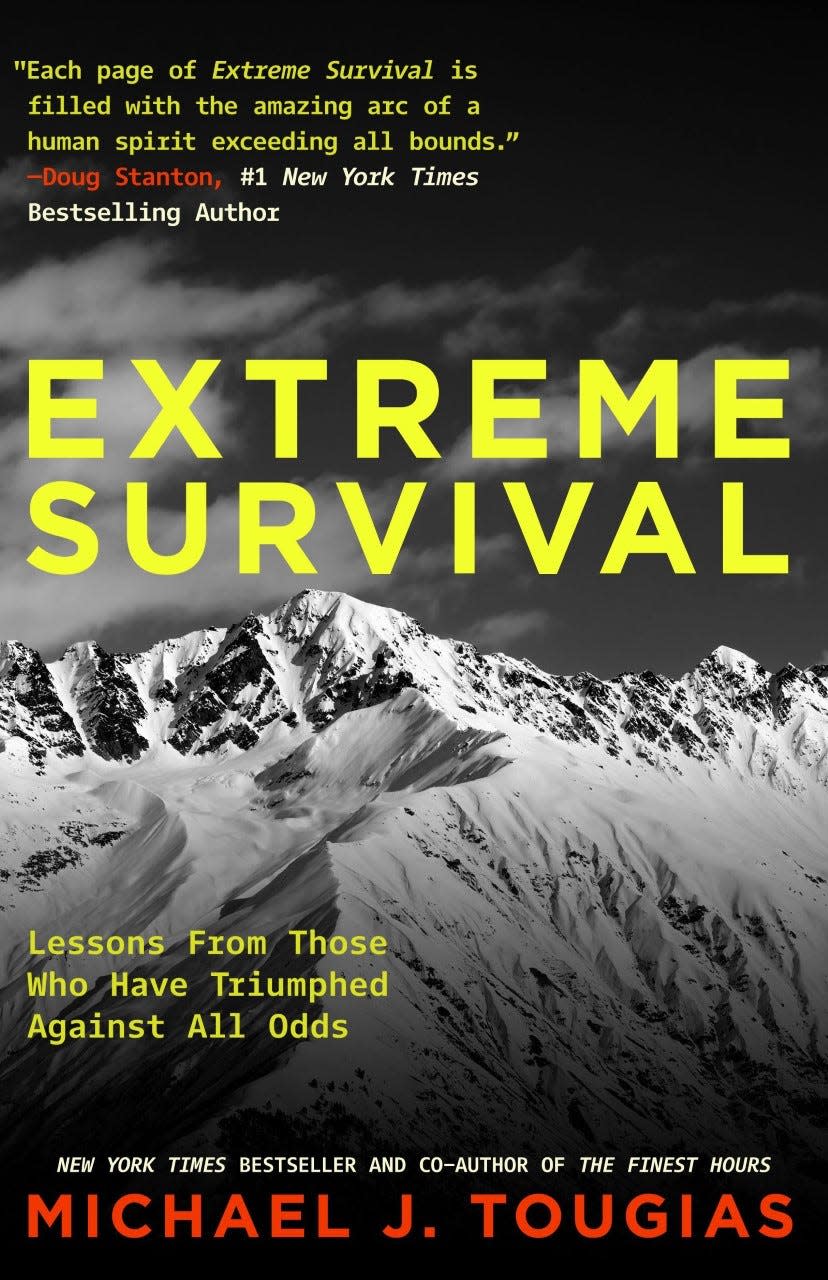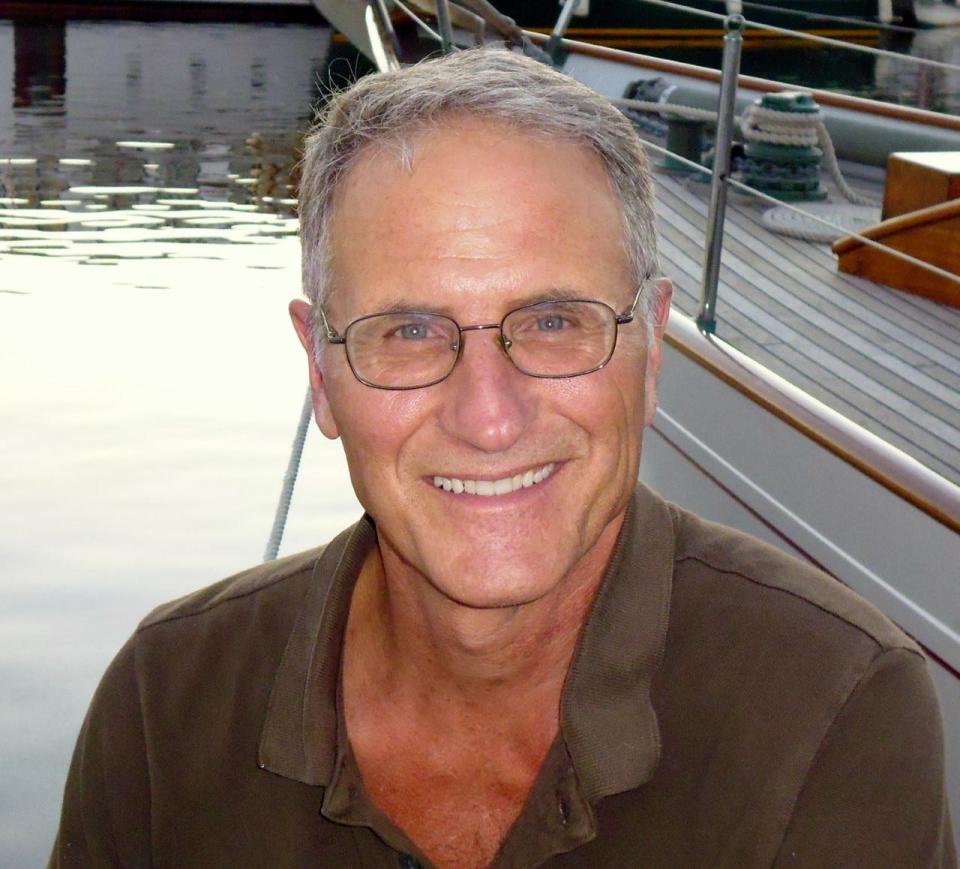'Extreme Survival' book sees bravery with Cape Cod ties. Here's how.
"The five shipwreck survivors clinging to the eleven-foot inflatable Zodiac were in the trough of a thirty-foot swell and looked up into the green walls of water. That's when they saw the sharks."
So begins Plymouth author Michael Tougias' newest book, "Extreme Survival: Lessons from Those Who Have Triumphed Against All Odds," released Dec. 6 by Mango Publishing.
Among the five survivors in that boat: Brad Cavanagh, of Bourne, who was then 21 years old. It was October of 1982, and the group was in a bad situation in tempestuous seas about 60 miles off North Carolina.

"His story is so amazing it starts the very first sentence of the book," said Tougias.
It is one of about 60 harrowing tales in the 222-page book.
Tougias has written, or co-written, children's literature and books for adult readers, including one that was made into a movie by Disney in 2016, "The Finest Hours."
Over his writing career, Tougias has explored true survival and rescue stories, history, humor and the outdoors, and memoir and outdoor adventure. "Extreme Survival" sums up his encounters with dozens of survivors over the years.
More:'The autos of the 1800s': Uncovered shipwreck at Race Point likely 19th-century schooner
"Extreme Survival is a project I’ve been planning since I first started writing books about true survival stories, over 30 years ago," Tougias said.
How did Michael Tougias write "Extreme Survival"?
He's been keeping files about survivors, along with interview notes from about 70 survivors he interviewed, he explained. He also supplements the survivors he interviewed with survivors from history, from Antarctic explorer Ernest Shackleton to John McCain to Mary Rowlandson in King Philip’s War.
"Having done all the research in advance, the writing went smoothly in just a one-year period and I was able to really focus during the COVID lock-down because I was not doing any speaking," he said.
Besides Cavanagh, his new book features other survivors who have had Cape Cod homeports: Ernie Hazard and Peter Brown.

The chapters, he noted, "are grouped by the common type of mindsets survivors used to get through the ordeal they were in and keep their sanity."
"So within the 12 chapters there are about five survival stories per chapter. Some are quite in-depth studies and others are much shorter and primarily focus on how they made it to the other side of the disaster they were in," he said.
Michael Tougias is drawn to individuals who have survived an ordeal
Tougias can't seem to get enough of writing about people who have done extraordinary things.
Whenever he comes across a survival story where he thinks to himself, "I could have never made it," he wants to interview the person and learn about the whole ordeal, no holds barred, he said.
Tougias had one life-or-death experience that he wrote about in his memoir, "The Waters Between Us," but his survival, he said, "had nothing to do with any mental toughness but rather just plain luck that I made it."
More:Erosion uncovers Chatham shipwreck
Still, he said, "I believe we are all capable of doing more than we think we can when in a critical situation."
Every person can help themselves get out of an ordeal with 'the power of little steps'
"By focusing on the immediate and thinking, 'What can I do to better my situation in the next hour?' we can take a predicament that seems overwhelming and break it down into what I call 'the power of little steps,'" he said.
But then there are people he calls "extreme survivors" — "those who endured multiple-day fights for their lives."
"They do seem to have some common character traits. They are thick-skinned individualists who are not afraid to tackle difficult trips or projects entirely on their own," Tougias said. "One word I would use to describe them is composed. That does not mean they don’t have fear in these awful situations, but rather they can think clearly and take action despite their fear."
More:Sunken fishing vessel Leonardo found off Martha's Vineyard
He counts the stories with Cape Cod ties as among the toughest he's encountered.
"Ernie’s occurred off Cape Cod and Brad’s was far off the coast of the mid-Atlantic. Both men faced the longest odds possible of making it through their predicaments. I bet only 1% of the people on the planet could do what they did and keep making the proper decisions under such pressure," Tougias said.
There are common traits for extraordinary survivors, Tougias says
After so much time spent over the years interviewing survivors, and researching survivors from history, common patterns in the techniques and mindsets have emerged, Tougias said.
"Almost every survivor I interviewed was humble, yet confident, with a dry sense of humor," Tougias said.
They all preferred to be participants rather than spectators, so gravitated toward hobbies that were active and often solitary, he said.
Cavanagh was one of the most resourceful he spoke to.
More:Shipwreck comes ashore in Wellfleet
Hazard, too, thrown in and out of a life raft in a storm in the North Atlantic, had a similar mindset, telling Tougias he told himself, “I may not make it, but I’m going to go down fighting.”
"One last technique survivors have used is giving themselves pep talks, often out loud," Tougias said. "They pat themselves on the back and they celebrate little achievements. Too many of us are looking for others to give us the credit we might deserve, but survivors have taught me to have my own little celebrations and be kind to myself whenever I’m doing my very best."
Commercial fishermen in New England have the goods
While New Englanders have a reputation for being tough and resourceful, when it comes to surviving Tougias isn't sure they are tougher than everyone else. But he can say that commercial fishermen who call the region home certainly are.
More:Grounded fishing vessel refloated in Chatham
"They spend time on the open ocean where there is no help nearby if something goes wrong," he said. "So I think they learn resourcefulness early in their career. Most of the commercial fisherman and mariners who make their living on the sea are true individualists and value making their own decisions."
Commercial fishermen are not intimated by a lonely setting such as the sea, so if they find themselves in a survival situation all alone, that "aloneness" doesn't paralyze them from taking action, he said.
Tougias said he is "forever grateful" to the survivors who "opened their hearts to me and trusted me with their stories."
"And when I have had to face a difficult challenge, not life or death, I use some of the same techniques and mindsets I learned from survivors to adapt and overcome the adversity I’m facing," he said.
Gain access to premium Cape Cod Times content by subscribing.
This article originally appeared on Cape Cod Times: Plymouth author inspired by survival stories with Cape Cod ties
